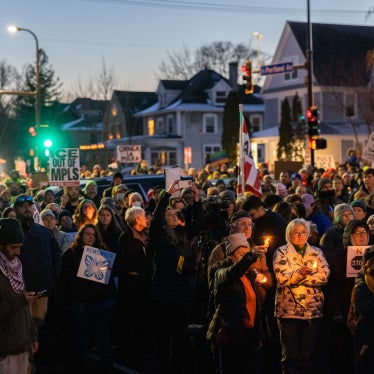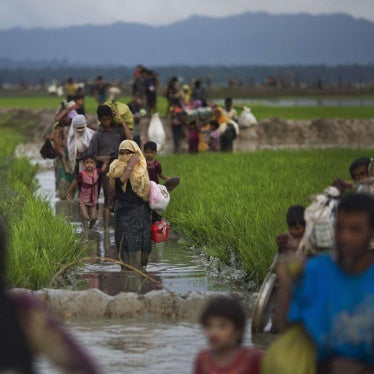(Tunis) – Libyan opposition authorities are arbitrarily detaining dozens of civilians suspected of activities in support of Muammar Gaddafi, Human Rights Watch said today. The opposition authorities, which exercise control in eastern Libya and parts of the west, should provide the detainees with full due process rights or release them, Human Rights Watch said.
The authorities should also bring volunteer security groups that have formed in the east under a recognized civilian authority and investigate their alleged abuses, Human Rights Watch said. One detainee of a volunteer group was apparently tortured to death in custody.
“There is no excuse to delay the rule of law in areas under opposition control,” said Sarah Leah Whitson, Middle East and North Africa director at Human Rights Watch. “The authorities should rein in volunteer security groups, establish a clear civilian authority for criminal justice, and make sure detainees get full due process rights.”
Arrests should be made only by civilian authorities based on concrete criminal charges backed by evidence, rather than on vague accusations of pro-Gaddafi activity, Human Rights Watch said. Civilian detainees should be informed of the grounds for their detention, have access to a lawyer, and be able to challenge the allegations before an independent judicial authority.
Over the past two months, Human Rights Watch has visited rebel-held detainees in Benghazi, Misrata, and Zintan, interviewing the detainees and the opposition officials holding them. In all three opposition-held cities, the authorities allowed Human Rights Watch unrestricted access, including private meetings with detainees.
As of May 28, 2011, opposition forces were detaining about 330 civilians and combatants – 118 in Benghazi, 160 in Misrata, and 52 in Zintan. Detainees in some eastern Libyan towns have been released or transferred to Benghazi after interrogation. Additional detainees may be held in other opposition controlled cities and towns.
The exact number of civilian detainees – non-fighters, most of them accused of association with Gaddafi’s internal security apparatus or Revolutionary Committees – remains unclear because the opposition authorities do not always distinguish them from captured fighters. The Revolutionary Committees are an influential ideological organization Gaddafi has used to enforce control.
In Benghazi, at least 41 of the detainees as of May 28 were civilians. Human Rights Watch interviewed 20 of them privately between March and May. None complained of mistreatment in detention or showed signs of physical abuse, but four alleged they had been physically abused when they were captured. None had ¬seen a lawyer or been able to challenge their detention before an independent judicial authority.
“I have not seen a lawyer or a judge,” said one civilian detainee in Benghazi who was subsequently released. He claimed he was being held “just because someone hated me.”
Senior members of the National Transitional Council (NTC), the opposition ruling body with de facto control over the east and parts of the west, say they recognize the problems and are working to correct them. Mustafa Abdul Jalil, chairman of the NTC and the justice minister under Gaddafi from 2007 until the February 2011 uprising, told Human Rights Watch that civilian detainees would receive “a fair trial and someone to defend them.”
The main group responsible for detentions in Benghazi is a unit of the Martyrs of the February 17 Revolution, also known as the February 17 Brigade, which makes some arrests and runs the civilian detention facilities. The official in charge of civilian detainees, Mustafa el-Sagizli, told Human Rights Watch that the brigade reports to the rebel military commander, Abdul Fatah Younis.
The authority for arresting and detaining criminal suspects should be promptly transferred to a purely civilian institution that respects international human rights standards, Human Rights Watch said.
El-Sagizli told Human Rights Watch that the February 17 Brigade releases civilian detainees within 72 hours when it has no evidence against them. The investigator at the February 17 base in Benghazi estimated that as of May 28 the brigade had released about 200 civilians since detentions began in early March. Those released are required to sign a pledge that they will not “say or do anything against the Martyrs of the February 17 Brigade.” Relatives must promise to take responsibility if the person takes actions that “harm the revolution.”
Conditions for detainees visited by Human Rights Watch, both civilian and military, appeared to meet acceptable standards. All of the detainees in Benghazi, Misrata, and Zintan, interviewed in private, said they had adequate access to medical care, food and water. At the February 17 Brigade’s base in Benghazi, the detainees are allowed family visits and have been able to call relatives on a satellite phone.
In addition to arrests by the February 17 Brigade, however, dozens of volunteer security forces are arresting criminal suspects in eastern Libya, sometimes with excessive force, and delivering them to the brigade detention facility, Human Rights Watch said. These groups proliferated after the fall of Gaddafi’s government in late February and the dissolution of police forces in the east.
Fathi Terbil, a lawyer and member of the NTC, who has been the council’s interlocutor with the volunteer armed groups in Benghazi, said that 11 of these groups are operating independently in Benghazi alone, some with multiple bases. Jamal Bennor, the justice coordinator of the Benghazi Council, the body in charge of the city, put the number of volunteer groups there at above 40. Volunteer security forces are also active in other eastern cities.
Human Rights Watch documented one apparent death in custody by a volunteer group in Baida. Muhammad el-Dabr, a Jordanian citizen suspected of spreading pro-Gaddafi propaganda, died during interrogation in Baida on April 30, two people with direct knowledge of the case told Human Rights Watch. A person who viewed el-Dabr’s body said it showed signs of torture.
According to documents viewed by Human Rights Watch, a volunteer group called the February 17 Security Committee held el-Dabr from April 27 to 30. The group is one of seven volunteer security groups in the city that opposition authorities recently brought under their jurisdiction. An investigation is under way, and a local court has issued arrest warrants for two suspects, the Baida authorities told Human Rights Watch.
Opposition authorities should punish anyone found to have committed or sanctioned this apparent death in custody, Human Rights Watch said.
Bennor said the rebel authorities were working to rein in the volunteer armed groups. Benghazi’s police chief, Dr. Ashour Shuwil, said they would like to bring all the volunteer groups under the newly established Interior Ministry once proper procedures are in place.
In addition to arbitrary detentions of suspected Gaddafi supporters, at least 10 former Gaddafi security officials and Revolutionary Committee members have been killed in eastern Libya over the past three months, opposition authorities told Human Rights Watch. In Benghazi, five were killed – Salah al-Sharif, an alleged member of a Revolutionary Committee, and Nasser al-Sirmani, Ziad al-Zwei, Ibrahim Khalifa Sermani, and Hussain Ghaith, all security officials. In March and April, five members of the Internal Security Agency were killed in Derna: Mustafa Ragis, Ezet Buhatwa, Faraj Dalel, Muftah Adaybani, and Salem Hawari.
Opposition authorities said they had opened investigations into these killings. Prompt and independent investigations into the killings and other apparent score settling are urgently required, Human Rights Watch said, and courts following due process should deal with former officials who violated the law.
Gaddafi forces have conducted wide-scale arrests in the areas they control of people who supported or are suspected of supporting the opposition, holding them in civilian and military detention facilities. The government has not provided any information about the number of people it has arrested or the charges they face.
Those released from government custody, both Libyans and foreigners, have reported beatings, torture, mock executions, and the sexual harassment of women.
The Gaddafi government’s deplorable human rights record does not absolve the opposition authorities from respecting human rights and abiding by international humanitarian law, Human Rights Watch said.
The NTC, as the de facto governing body in eastern and parts of western Libya, is responsible for respecting fundamental human rights and holding those who abuse them to account, Human Rights Watch said.
These rights, set forth in the Universal Declaration of Human Rights as well as various international human rights treaties, include the rights to life; liberty; fair trials; freedom from torture and other cruel, inhuman, or degrading treatment or punishment; freedom of expression, association, and peaceful assembly; and equal treatment before the law. Protection from arbitrary detention includes the right to be informed by a judicial authority of the specific grounds for arrest, to be able to challenge the basis for detention, and to have access to a lawyer, family members, and medical care.
Opposition armed groups are bound by international humanitarian law, or the laws of war, including Common Article 3 to the Geneva Conventions of 1949 and customary international law. Common Article 3 provides for the humane treatment of detainees and that criminal sentences be imposed only after trials by a court meeting international fair trial standards. Arbitrary deprivation of liberty is prohibited.
On March 25, the NTC formally pledged to uphold international humanitarian law, in particular in relation to detainees.
“The people of Libya are all too familiar with arbitrary arrests and detention without charge from four decades of Muammar Gaddafi’s rule,” Whitson said. “The opposition authorities should reject that abusive legacy and create a legal framework to ensure respect for Libyan and international law.”







